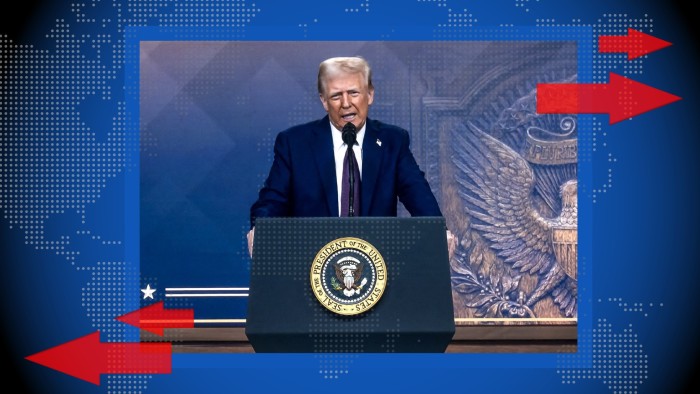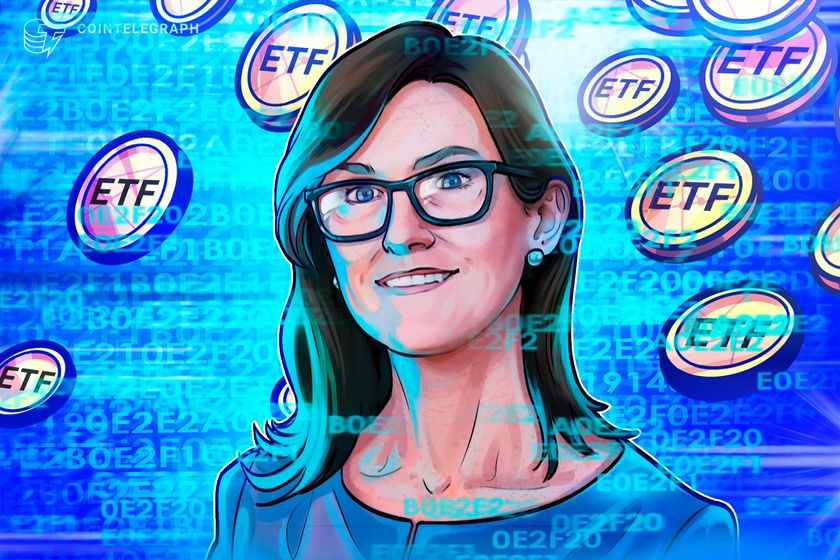The televised image of Donald Trump towered over delegates in a conference hall in the ski resort of Davos on Thursday, embodying the outsized impact the new president has had just a few days into his second term in the Oval Office.
Prime ministers, business leaders and the president of the European Central Bank had queued up to see him address the World Economic Forum, his first speech to a global audience since returning to the White House. One attendee joked about fetching some popcorn for the show.
Trump did not hold back, provoking nervous laughter as he issued a series of demands and ultimatums to allies and rivals alike.
Saudi Arabia and other producers must cut oil prices, global central banks “immediately” needed to slash interest rates, and foreign companies must ramp up investments in US factories or face tariffs. The EU — which came in for particular opprobrium — must stop hitting big American technology companies with competition fines.
“We are going to be demanding respect from other nations,” the president said. His predecessor had “allowed other nations to take advantage of the US. We can’t allow that to happen any more.”

Trump’s demands came amid a frenetic first week in office in which the president launched a blitzkrieg of executive orders and announcements intended not just to reshape the state but also assert America’s economic and commercial supremacy. Tariffs of up to 25 per cent could be slapped on Canada and Mexico as early as February 1, riding roughshod over the trade deal Trump himself negotiated in his first term.
China could face levies of up to 100 per cent if Beijing failed to agree on a deal to sell at least 50 per cent of the TikTok app to a US company, while the EU was told to purchase more American oil if it wanted to avoid tariffs. Underscoring the new American unilateralism, Trump pulled the US out of the World Health Organization, as well as exiting the Paris climate accord for a second time.
Strikingly, Trump reached for an obscure, 90-year-old provision in the US tax code to threaten a doubling of tax rates for foreign nationals and companies if their home countries were deemed to have imposed “discriminatory” taxes on American multinationals.
This proposal throws a “hand grenade” at international tax policymaking, says Niels Johannesen, director of the Oxford university Centre for Business Taxation at Saïd Business School. The move suggests a determination to “shape other countries’ tax policy through coercion rather than through co-operation”, he adds.
The plans unveiled this week by the new president raise the spectre of a multi-front economic war as Trump uses the power of America’s resurgent economy to rebalance the international order in his favour.

The key question, say investors and policymakers, is whether this amounts to a more intense version of the transactional, dealmaking approach seen in Trump’s first term, or a shift towards unbridled unilateralism, where a White House unbound by the constraints of international law cajoles and intimidates foreign governments and businesses.
“He’s weaponising everything: trade, tax and energy. I’m worried that finance will get weaponised too,” says the head of one of the world’s largest sovereign wealth funds. “Most people are betting that he cares about the stock market — that’s the only check. That and the fact that he has said he wants to be a peacemaker.”
In Davos, leading US executives were eager to cheer Trump’s agenda — suggesting there is little anxiety within the corporate sector about the US potentially rupturing the global rules-based order.
Tariffs are an “economic tool. That’s it,” said Jamie Dimon, CEO of JPMorgan Chase, in a CNBC interview at Davos this week. “If it’s a little inflationary, but it’s good for national security, so be it. Get over it.”
The US stock market rallied this week as investors digested the prospect of an easing of regulations governing banks and high-technology companies, as well as the announcement of a massive $100bn artificial intelligence infrastructure project launched by OpenAI and SoftBank. By the end of the week (as of late Friday afternoon in New York), the S&P 500 index was up 1.8 per cent.
“Anecdotally, people talk to CEOs and say they all feel super-positive,” says Mahmood Pradhan, head of global macro at Amundi Investment Institute.
“If I ask myself what justifies the animal spirits, the banking deregulation stuff is real and the prospect of lower corporate taxes is real.”

Yet, outside the US, the threat of a widening array of trade barriers and conflicts over tax policies is weighing on the economic outlook. Valdis Dombrovskis, the EU’s economics commissioner, says a fracturing of global trade would be of particular worry to economies like Europe, where trade accounts for more than a fifth of GDP.
He cites IMF estimates showing that extreme geoeconomic fragmentation in trade could wipe out 7 per cent of global GDP over the medium run. “If this global economic fragmentation settles in — and there is a risk of that — it is going to have sizeable negative economic consequences.”
Even while bracing for a tariff onslaught, though, some European policymakers claim to see potential upsides.
“It is a new environment which is definitely less comfortable for Europe, but which also offers a lot of opportunities,” says Alexander de Croo, Belgium’s prime minister. “Europe can show there that we have stability and that you are in a predictable environment where investment can take place.”
European officials also say they could benefit from deeper trade ties with other countries that may be squeezed out of US markets. “Countries are coming to us because they want to diversify away from the US,” says a senior EU official.

“We need to keep on being open but not being naive,” says Spanish economy minister Carlos Cuerpo. “We need to have our companies competing under equal footing, equal conditions and a level playing field with respect to others. That was the case with China. That will need to be the case also with the US.”
While the US and Europe have long railed against Chinese trade practices, Beijing was quick this week to present itself as an upholder of the global, rules-based order rather than its nemesis.
Speaking the day after Trump was inaugurated, Chinese vice-premier Ding Xuexiang insisted that economic globalisation “is not a ‘you lose, I win’, zero-sum game”. The largest countries of the world needed to “lead by example” he said, praising international bodies including the World Trade Organization and UN.
The irony of China presenting itself as a free-trading paragon while Trump seeks to extract concessions from his closest allies by brute economic force was not lost on Davos attendees watching Ding’s performance.
Despite the barrage of measures and statements fired out by the White House this week, most global policymakers are taking a wait-and-see approach to Trump’s aggressive transactionalism, rather than leaping to conclusions about the longer-term ramifications for the global economic system.
“Why put my cards on the table before he has?” says the senior EU official.
Jonathan Reynolds, the UK’s business secretary, acknowledges there remain “lots of questions” about the president’s approach. “Is it about leverage around negotiations? Is it about revenue-raising in terms of tariffs?” The UK, he says, will continue to argue for a “much more open, global trading economy.”

There is little question, however, that Trump is signalling a significant escalation in how he will wield trade as a weapon compared with his first term.
“Those around Trump have had time to build up a systematic, methodological approach for protectionist trade policy and it shows,” says former UK trade department official Allie Renison, now at consultancy SEC Newgate. The approach will be to build up a case file of “evidence” against countries, she says, and then use it to extract concessions in areas of both economic and foreign policy.
The question remains how far Trump is willing to go. The danger of trampling on the rules-based order, says Jeromin Zettelmeyer, head of the Bruegel think-tank, is a complete breakdown in the diplomatic and legal channels for settling international disputes.
If Trump were to pull out of a wider range of international frameworks, such as the WTO or the IMF, he warns, then the arrangements that help govern the global economy could get “substantively destroyed”.

The extreme case, he adds, is that “they really do a Putin” — namely by violating the sanctity of international borders. Taking control of Greenland or the Panama Canal by force, as Trump has threatened, would amount to “the reintroduction of the law of the jungle”.
Michael Strain, director of Economic Policy Studies at the American Enterprise Institute think-tank, questions whether Trump will reverse the “fundamental forces” that drive global economic integration — and whether the president even wants to do so. But regardless, he says, the uncertainty about his true intentions “makes it hard for business to plan, creates a chilling effect on investment, and creates tensions with our allies.”
Some caution against being awestruck by Trump’s threats or his espousal of capitalism without limits, because his agenda was so incoherent.
“What we are seeing is huge doses of American hubris,” says Arancha González, dean of the Paris School of International Affairs at Sciences Po. “We are blinded by the intensity of all the issues put on the table and by Trump’s conviction. But we are not looking at the contradictions. It’s like we are all on an orange drug.”
Additional reporting by Harriet Agnew in Davos and Peter Foster in London
Data visualisation by Keith Fray






























You must be logged in to post a comment Login